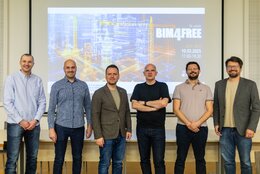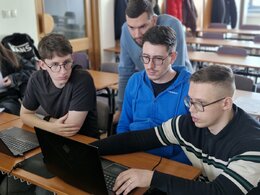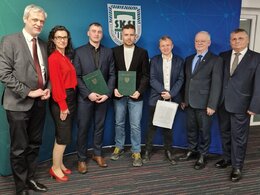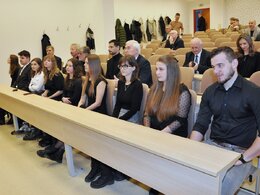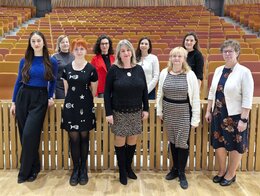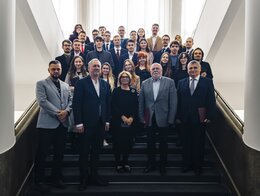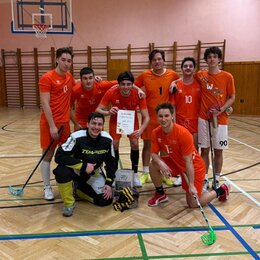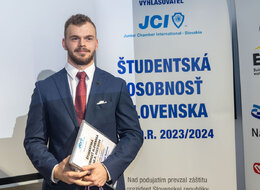Graduates receive a complete master education in the field of construction. It focuses on theory and practice in the construction of civil and water structures. Graduates learn about scientific methods of research, including modelling, experimenting, evaluating, analysing and using the achieved results in construction practice. They can bring their own, original solutions to problems in the field of construction, especially in the preparation, implementation, reconstruction, rehabilitation and use of all types of buildings and sets of buildings at higher management levels. The specialization of students is dependent on their choice, concerning the direction they wish to take.
Study programme: Civil Engineering
Level of study: master
Form of study: full-time
Standard length of study: 2 years
Admitted students planned: 10
Guarantor of study programme: prof. Ing. Jana Frankovská, PhD.
Study coordinator
This study programme is charged. For more information see section Tuition Fees.
| Degree Programme Title | SM | CL | AT | LS | PP |
| Building Constructions and Design (AKP) * | full-time | S | Ing. | 2 | 60 |
| Civil Engineering (CE) | full-time | E, S ** | Ing. | 2 | 10 |
| Geodesy and Cartography (GaK) | full-time | S | Ing. | 2 | 30 |
| Landscaping and Landscape Planning (KKP) | full-time | S | Ing. | 2 | 20 |
| Mathematical and Computational Modeling (MPM) | full-time | S | Ing. | 2 | 20 |
| Structures of Buildings (NKS) | full-time | S | Ing. | 2 | 40 |
| Building Construction and Architecture (PSA) | full-time | S | Ing. | 2 | 40 |
| Building Services (TZB) | full-time | S | Ing. | 2 | 40 |
| Building Technology (TS) | full-time | S | Ing. | 2 | 60 |
| Hydraulic Engineering and Water Resources Management (VSVH) | full-time | S | Ing. | 2 | 20 |
- SM - study mode
- CL – course language: E - English, S – Slovak
- AT – academic title
- LS - length of study (years)
- PP - planned number of accepted applicants
- * Abbreviations of study programmes and Departments are the same as in Slovak
- ** Good knowledge of Slovak and English is required.
Architectural Construction and Design (AKP)
Graduates of this study programme acquire a comprehensive second-degree university education with a specialization in building structures with the focus put on technological aspects of architectural design, projects, and implementation of buildings. They are able to creatively and scientifically tackle technological issues of architecture, to find and to implement their own solutions to problems in the field of design and implementation of new architectural works as well as in the process of reconstructing and modernizing original buildings. Graduates are prepared to apply theories, methods, tools, principles, and concepts of technology in architecture in various fields, e.g. structural development and protection of buildings and their physical and static analyses, technological and environmental development of the architectural environment of buildings and modern construction technologies of buildings and economics of buildings within a process related to the comprehensive design and implementation of architectural works. Graduates master the development of ecological, energy-efficient architecture, while taking into account design elements and details of architectural structures with the emphasis set on the primary requirements for construction materials, design elements and structures established by EC Directive 89/106/EEC.
Graduates can be employed in areas working on solutions to complex issues of technological aspects of architecture in research, development, design and, subsequently, in implementation of the developed solutions. . They can effectively work as independent members in teams and as heads or coordinators of interdisciplinary tasks. Graduates can also be employed in development activities in various areas, e.g. management of architectural development projects, building contractor organizations, organisations concentrating on environmental protection, within educational systems and the like.
Guarantor: prof. Ing. Jozef Hraška, PhD.
Study coordinator
Civil Engineering (CE) - taught in English and Slovak
Graduates receive a complete master education in the field of construction. It focuses on theory and practice of civil constructions and water structures. Graduates learn scientific methods of research, including modelling, experiment and its evaluation, analysis of results and application of the achieved results to tasks of construction practice. They can bring their own, original solutions to problems in the field of construction, especially in the preparation, implementation, reconstruction, rehabilitation and use of all building types and sets of buildings at higher management levels. The specialization of graduates depends on their choice, given the specialization they wish to study.
Guarantor: prof. Ing. Stanislav Unčík, PhD.
Study coordinator
Geodesy and Cartography (GaK)
Graduates of this study programme acquire a complete second-degree university education in the field of geodesy and cartography with the general focus put on technologies used in areas of global and regional geodesy, cadastre of real estate, land consolidation, cartography and geography, geoinformatics, and in engineering geodesy. Graduates can choose elective subjects from several groups of mandatory subjects. This gives them the chance to concentrate on selected areas of geodesy and cartography, particularly on areas concerning the Earth and its physical aspects, the development of geodesic systems, the design and realization of structures, the development of landscape environments, information systems for land use and cadaster, engineering activities involved in land consolidation, and the development of maps, mapping works and spatial systems. Graduates can be employed in state development and contractor organizations, in scientific and research institutes, in state administration authorities at central, regional and local levels as well as in the private sector, or they can choose a third-level study programme. Graduates can acquire the authorization to certify results of selected activities in areas of geodesy and cartography under Act No. 215/1995, Coll. on Geodesy and Cartography, and can become members of the Chamber of Surveyors and Cartographers.
Guarantor: prof. Ing. Juraj Janák, PhD.
Study coordinator
Landscaping and Landscape Planning (KKP)
Graduates receive a comprehensive second-degree education in the field of landscaping and landscape planning. They understand the essence of physical, geoscientific, biological, ecological laws taking place in nature and the interaction between natural and anthropogenic components. Graduates understand the principles of sustainable development in the creation and protection of the environment. At the same time, they will understand the technologies of improving and enhancing the country's individual components. Graduates will know more about the environmental engineering field of the external environment, waste management, water management of the landscape and urban areas, landscape and garden architecture, management of landscape and garden creation. They have a profound knowledge of project and coordination activities and European legislation and standards aimed at environmental protection and landscape and garden architecture. Graduates can perform independent management, coordination, advisory and consulting activities in the application of environmental principles in the appropriate sphere of production, engineering, architectural conceptual, planning, and social activities, as well as in assessing the impact of anthropogenic activities in terms of environmental protection, work as an assistant in the scientific research team in the field of landscape and landscape architecture as well as environmental engineering. They can use advanced procedures of computer support of engineering work to design technical solutions and use information systems, including geoinformation technologies, at a high level.
Guarantor: prof. Ing. Viliam Macura, PhD.
Study coordinator
Mathematical and Computational Modeling (MPM)
Graduates acquire a complete second-degree university education with a specialization in Applied Mathematics with the focus put on computer modelling and analysing engineering tasks. Graduates have a profound knowledge of modern methods of applied mathematics, they know how to use, co-develop, analyse and effectively implement numerical, statistical, optimizational, graphical and visualization methods in modern computer architectures. They are able to apply those methods in areas, where mathematical methods and computer analyses are used to resolve practical tasks, e.g. civil, electrical and mechanical engineering, bio-engineering, geodesy, informatics, computer graphics, image processing, statistical data analysis and in certain economic and financial applications. Graduates can be employed primarily in interdisciplinary teams in companies and research institutes focusing on the development of modern technologies: software development. They can also find employment in companies dealing with scientific and technological computations, data analyses, visualizations, computer graphics, image processing, mathematical analyses, or with simulations of engineering processes.
Guarantor: prof. RNDr. Karol Mikula, DrSc.
Study coordinator
Structures of Buildings (NKS)
Graduates are qualified to perform static design, to organize and to manage buildings made of concrete, masonry, steel and timber. They are further qualified for planning, maintaining and reconstructing buildings. They find employment in design in architectural and static studios, in investment organizations, and in research and educational establishments. They are able to design bearing building structures of various types serving various purposes. They are aware of the social, legal and economic aspects of their profession and of the need for life-long learning. They are prepared for third-degree study programmes in the Theory and Construction of Building Structures. They can be employed as members in creative design teams, in the building sector for designing, assembling, operating and maintaining building structures. They can work in computing centres, in research and educational institutions, and in development and contractor units, state administration and in both private and public sectors.
Guarantor: prof. Ing. Jaroslav Halvonik, PhD., prof. Ing. Juraj Králik, PhD., and doc. Ing. Rudolf Ároch, PhD.
Study coordinator
Building Construction and Architecture (PSA)
The study programme: Building structures and architecture focuses on educating civil engineers and university-educated experts for professions in creative design and for professions related to building structures (residences, their amenities and industrial and agricultural facilities). The study programme follows an 8-semester Bachelor study programme. There are prerequisites for the acquisition of a certification from the Chamber of Architects and the Chamber of Civil Engineers. Graduates can be employed under Act No.138/1992, Coll. on Certified Architects, under § 4 and Certified Civil Engineers under § 5, Section 1, subsection a. Graduates are able to perform comprehensive design activities and to develop architectural designs, plans, and projects as well as to work in reconstruction and modernization of buildings and in renovation of building monuments. They are able to process supporting data for documentation of master plans. Graduates can perform project management supervisory tasks and develop supporting data for assessing the environmental impact on buildings.
Graduates can develop scientific approaches to architectural and technological issues within architecture. They master the development of intelligent buildings and ecological energy-saving architecture taking into account the elements of architectural design, operations, and static aspects of designing architectural structures and their elements. They can concentrate on details with the emphasis put on their aesthetic and functional value and on the specific requirements of building materials, elements, and structures. Graduates of this programme can be employed in design, development and in contractor units, in research and development, in state administrations, building contractor organizations and management and in corporate fields.
Guarantor: prof. Ing. Boris Bielek, PhD., and prof. Ing. arch. Michal Hlaváček
Study coordinator
Building Services (TZB)
Graduates acquire a comprehensive second-degree university education with a specialization in Building Structures and Architecture with the focus put on theory and on the development of technological components in architectural structures. They have knowledge of the composition and inter-relation of separate components of technological facilities, heating systems, ventilation and air conditioning systems, metering and regulation and of sanitary technology systems. They are able to assess the quality of internal environments, of the energy intensiveness of various kinds of buildings and to conduct experimental analyses of temperature, aerodynamics, humidity and of the microbiology of indoor building environments. They are able to assess the impact of facilities based on external ecological aspects. They can be employed as members in creative teams, as team leaders or as independent experts searching for the optimum solutions to problems related to installations, energy and management systems in buildings, or to the development of new technologies and technological equipment for buildings. They can also deal with the realization of building structures within technical and technological units for ensuring the application of facilities, with the coordination of components of technological facilities of buildings, or with the area of environmental protection during constructions and operations of buildings. Furthermore, graduates can find employment in state administrations and regional development, in educational systems and in other similar fields.
Guarantor: prof. Ing. Dušan Petráš, PhD.
Study coordinator
Building Technology (TS)
Civil engineers graduating of the Realization of Buildings study programme can hold positions and conduct activities in areas dealing with the preparation, construction, reconstruction, renovation, and usage of structures and of their complexes in higher management levels. They can hold positions such as: chief site managers, chief site supervisors, chief engineers for building-technological projects, chief managers of construction equipment, quality managers of building organizations, and directors of building organizations.
Guarantor: prof. Ing. Jozef Gašparík, PhD.
Study coordinator
Hydraulic Engineering and Water Resources Management (VSVH)
Graduates of this study programme acquire education with the focus put on the usage of water resources in rural and urban areas. They can project the implementation and operation processes of water structures. Graduates understand the construction process and the given technological, environmental, economic and legal aspects of designing, operating and implementing hydraulic structures, the harmful and destructive effects of water, the need of water protection, the use of hydro power, water transportation water supplies for residential, industrial and agricultural sectors, and the need of waste water treatment. They master modern information technologies, computer-aided design and methods analysing and controlling water management issues using geographical information systems. In line with the principles of sustainable development, they understand technological, environmental, economic and legal aspects of the concerned areas. They can be employed as members of creative teams, team leaders, or independent experts in design offices, enterprises, and businesses focusing on the use of water resources, the economical use of water, and water protection. They can work in industrial, agricultural and urbanized areas, in hydropower engineering, hydraulic structures, water transportation, water supply and waste water treatment, solid waste management, state administration units for water management and in water management research institutes, or in non-governmental organizations.
Guarantor: prof. Ing. Andrej Šoltész, PhD., and prof. Ing. Ján Szolgay, PhD.
Study coordinator
[/accordion-item]
[/accordion]

